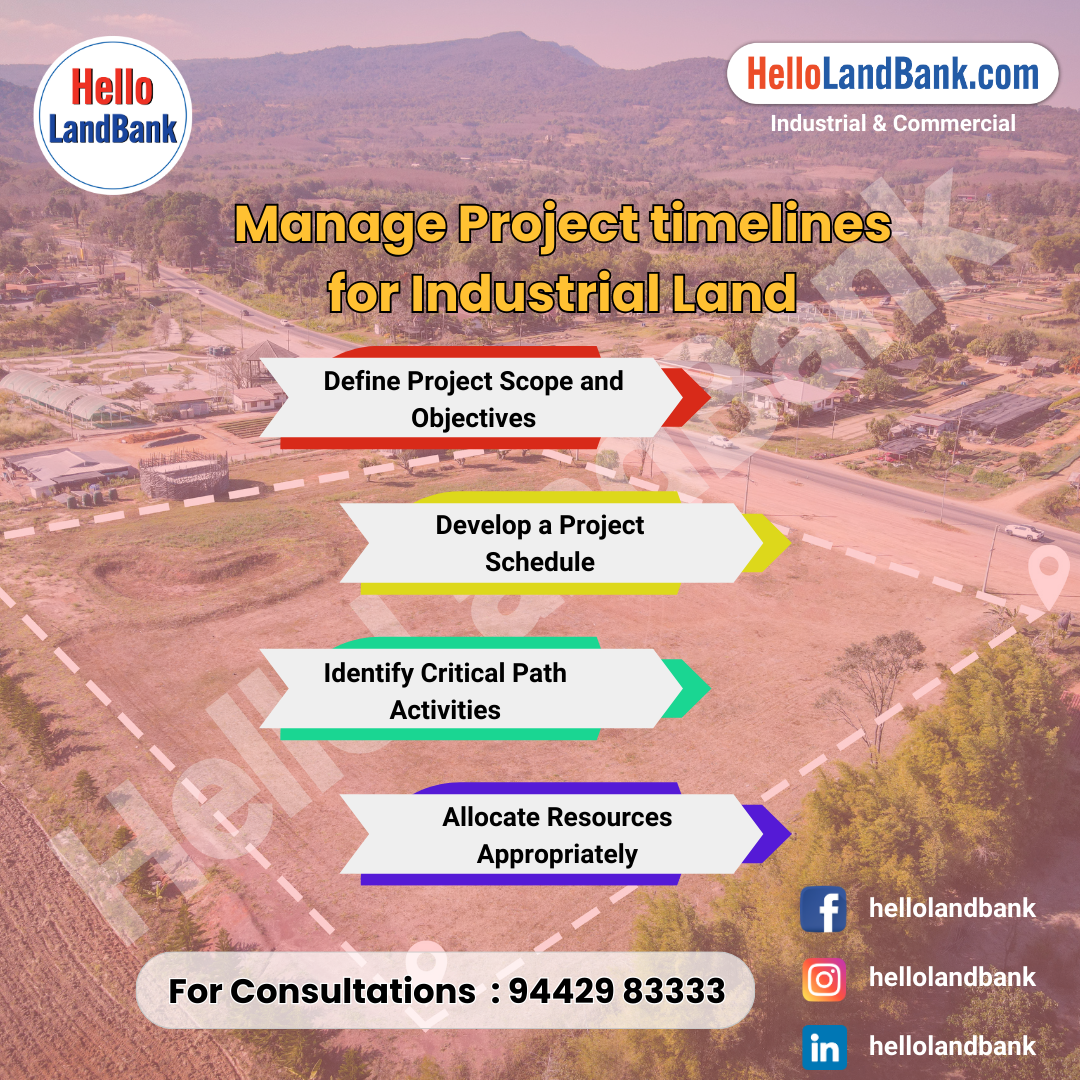Managing project timelines for industrial land development requires careful planning, coordination, and monitoring of project activities to ensure timely completion and successful delivery of development projects. Here are steps to effectively manage project timelines for industrial land development.
1. Define Project Scope and Objectives:
- Clearly define the scope, objectives, and deliverables of the industrial land development project, including land use requirements, development goals, budget constraints, and stakeholder expectations. Establish project milestones, deadlines, and key performance indicators (KPIs) to measure progress and track project performance throughout the development lifecycle.
2. Develop a Project Schedule:
- Develop a comprehensive project schedule outlining the sequence of activities, tasks, and dependencies required to complete the industrial land development project. Use project management software or scheduling tools to create a detailed project timeline, Gantt chart, or critical path method (CPM) schedule that identifies project activities, durations, start dates, finish dates, and resource allocations.
3. Identify Critical Path Activities:
- Identify critical path activities that have the most significant impact on project duration and completion. Determine the sequence of tasks that must be completed on time to prevent delays in the overall project schedule. Focus on critical path activities when allocating resources, managing workflows, and resolving potential bottlenecks to maintain project momentum and meet deadlines.
4. Allocate Resources Appropriately:
- Allocate resources, manpower, equipment, and materials effectively to support project activities and meet schedule requirements. Ensure that sufficient resources are available to complete critical tasks on time and address potential resource constraints or shortages that may impact project timelines. Optimize resource utilization, productivity, and efficiency to maximize project performance and minimize delays.
5. Implement Risk Management Strategies:
- Identify potential risks, uncertainties, and obstacles that may affect project timelines and develop risk management strategies to mitigate their impact. Conduct risk assessments, identify risk triggers, and develop contingency plans to address common risks such as weather delays, supply chain disruptions, regulatory issues, permitting delays, design changes, and unforeseen site conditions. Proactively monitor and manage risks throughout the project lifecycle to prevent schedule delays and minimize project disruptions.
6. Establish Communication and Coordination Protocols:
- Establish clear communication channels, reporting mechanisms, and coordination protocols to facilitate collaboration among project stakeholders, team members, and subcontractors. Hold regular project meetings, status updates, and progress reviews to discuss project timelines, address issues, and ensure alignment with project objectives. Foster open communication, transparency, and accountability to keep all stakeholders informed and engaged in the project.
7. Monitor Progress and Performance:
- Monitor project progress, performance, and adherence to schedule milestones using project management tools, performance metrics, and tracking systems. Compare actual progress against planned timelines, milestones, and deliverables to identify variances, deviations, or delays in project schedules. Conduct regular progress assessments, trend analyses, and schedule reviews to identify root causes of schedule slippage and implement corrective actions promptly.
8. Implement Change Management Processes:
- Implement change management processes to address scope changes, design revisions, and project modifications that may impact project timelines. Assess the impact of proposed changes on project schedules, budgets, and resources before approving or implementing them. Prioritize changes based on their significance, urgency, and potential impact on project timelines, and ensure that all stakeholders are informed of approved changes and their implications for project delivery.
9. Resolve Issues and Mitigate Delays:
- Proactively identify and resolve issues, conflicts, and bottlenecks that may arise during the project lifecycle to prevent schedule delays and minimize disruptions. Implement problem-solving techniques, conflict resolution strategies, and escalation procedures to address issues promptly and keep the project on track. Collaborate with stakeholders, subject matter experts, and decision-makers to overcome challenges and find viable solutions that support project timelines.
10. Evaluate and Adjust Project Plans:
- Continuously evaluate project plans, schedules, and timelines to assess performance, identify improvement opportunities, and adjust strategies as needed to optimize project outcomes. Conduct post-project reviews, lessons learned sessions, and performance evaluations to capture insights, identify best practices, and apply lessons learned to future projects. Use feedback from project stakeholders and team members to refine project management processes, improve scheduling practices, and enhance overall project performance for future industrial land development projects.
By following these steps and implementing effective project management practices, industrial land developers can successfully manage project timelines, minimize schedule delays, and deliver industrial land development projects on time and within budget. Effective project timeline management is essential for achieving project objectives, meeting stakeholder expectations, and maximizing the value of industrial land development investments.




